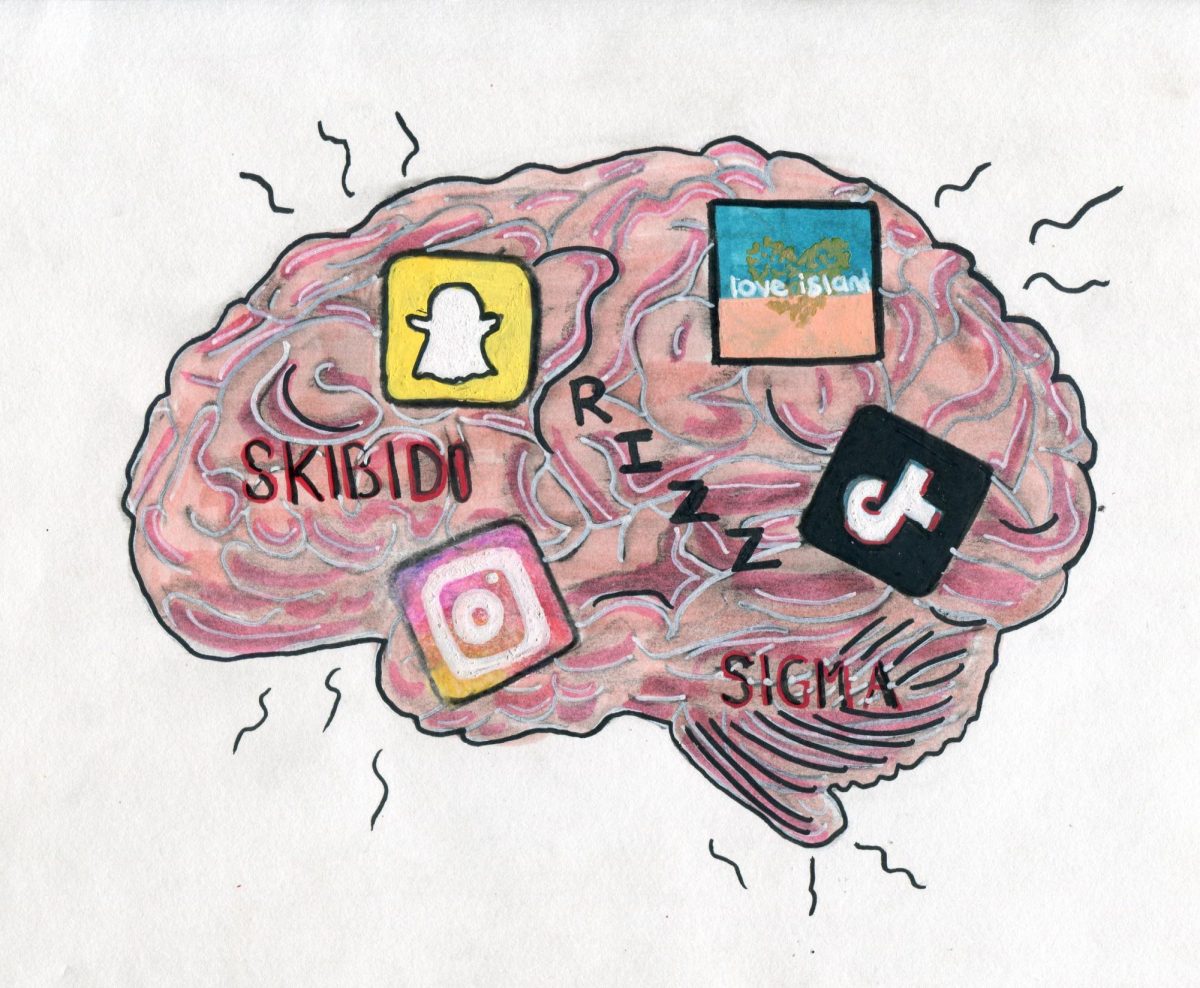There is a blinding flash of light from which enters a middle aged man of average height and build. Wearing a sumptuously embroidered velvet doublet, a pronounced collar, peach breeches, and a brown hose, he displays fully the fashion expected of a high class man of the Elizabethan era. His pointed beard, scholarly look, and an unfinished manuscript of The Tempest distinguish him immediately: he is William Shakespeare.
Teleported across time, Shakespeare immediately goes about learning as much as he can about this distant future. Though, interested in many aspects of the twenty-first century, what he was immediately drawn to was the new words and slang created, as he immediately opened a dictionary—a particularly urban one—and began to learn of the many ways in which English had evolved, taking careful notes (translated in a more understandable form for the modern scholar):
Brainrot: Ahh, what a word! Innately graphic, it describes with great intensity the effects of an unhealthy obsession. It is a word that describes a process not native to solely one generation, century, era, or age. Ahh, it is a word for the Edmunds, Richards, and, of course, Hamlets of this world.
Rizz: It is undoubtedly a satisfying word to say. With its prominent voiced z sound, it conveys a powerful thrill, fitting for what it describes. It is astounding to think that all the titillating intoxication of courtship can be conveyed in just one short syllable. What is even more profound is the strength and power the word bequeaths to the wielder of it—the “rizzler” as I am told. This idea of power is something one can easily forget, but one must always guard against, for Romeo, was never a rizzler—he was just “down bad” as they say. No, it was Benedick from Much Ado About Nothing—the handsome and eternal bachelor—who truly earned the venerable title.
Skibidi Toilet: My eyes have still not recovered from the vulgar obscenity that this word describes. And yet, despite that, I have rarely encountered a word with a symbolic meaning as rich as this. The word reminds me of the terrible Caliban, for what can describe the beast better? A misshapen creature in his own right, frothing with vile insults of all kinds, and sadly trapped in the prison of forced servitude, Caliban can only be represented by the wretched sneering head trapped in a modern loo. Many things are different in modern writing, but I am glad to see that poetic imagery is still used, and what’s more, is enjoyed by even the smallest of children—“iPad kids” as they say; ah, “Gen Alpha” is truly chief in comparison to its simpleton predecessors.
Sigma: This is a slang greatly intriguing due to its Greek roots. The “sigma male” as I am told is the pinnacle of masculinity, a scion of the great Heracles himself (or in modern terms, “a chad”). However, one often forgets—and to their own great peril—the sigma female. One may think that such a person doesn’t exist, and that the words sigma and female only create a vain juxtaposition when placed together, a rather untrue idea. To prove my point, I cite one of my own characters, Lady Macbeth. She is, without a doubt, far more courageous and ambitious than her cowardly husband, and she is furthermore not afraid to put him in his place, belittling his masculinity, essentially rendering him a “beta.”
Skibidi Rizzler: In the particularly loquacious linguist’s lexicon one may also find a combination of several appellations strung together to create a specific meaning. Chief among these combinations is perhaps “Skibidi Rizzler.” Though to the untrained eye this may seem to be incongruous amalgamation, to the accomplished playwright these words convey a specific idea, perhaps smaller in breadth but far, far greater in literary merit. For, how can one describe the great Cleopatra in a better way? She has all the feminine charm, as they would say in these times, a “level 69 gyatt” and yet the purposes for which she uses her undoubtable “rizz” are undoubtedly immoral—“skibidi” to say the least.
Following the publication of these notes, several things happened: the resignation of several English professors, the creation of an AP Brainrot course, and, of course, the delight of several teenagers and children alike across the world.
“Though this be madness, yet there is method in’t” (Hamlet, Act 2, Scene 2).


